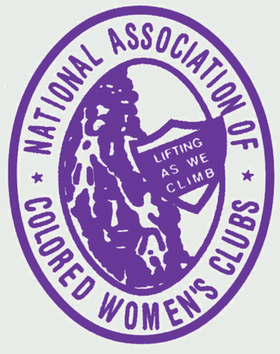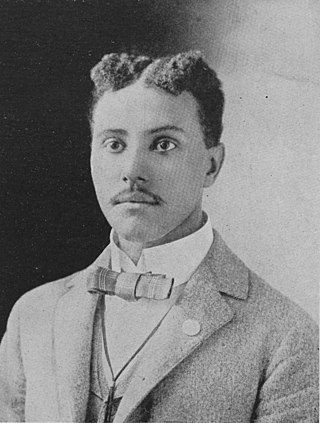
The National Association of Colored Women's Clubs (NACWC) is an American organization that was formed in July 1896 at the First Annual Convention of the National Federation of Afro-American Women in Washington, D.C., United States, by a merger of the National Federation of Afro-American Women, the Woman's Era Club of Boston, and the Colored Women's League of Washington, DC, at the call of Josephine St. Pierre Ruffin. From 1896 to 1904 it was known as the National Association of Colored Women (NACW). It adopted the motto "Lifting as we climb", to demonstrate to "an ignorant and suspicious world that our aims and interests are identical with those of all good aspiring women." When incorporated in 1904, NACW became known as the National Association of Colored Women's Clubs (NACWC).
The Boston Guardian was an African-American newspaper, co-founded by William Monroe Trotter and George W. Forbes in 1901 in Boston, Massachusetts, and published until the 1950s.
The Pittsburgh Courier was an African-American weekly newspaper published in Pittsburgh, Pennsylvania, from 1907 until October 22, 1966. By the 1930s, the Courier was one of the leading black newspapers in the United States.

The Advocate was a four-page weekly newspaper in Portland in the U.S. state of Oregon, established to cover issues relating to racial minorities. It was founded in 1903; microfilm of the paper is available through 1933, and the paper was covered as an active entity in other Portland press until at least 1936. The Advocate was known as Portland's second oldest black newspaper. In 1933 when the paper ceased publication it was the only remaining black-owned newspaper In its early days, it was known as the Mt. Scott Herald and possibly as the Beaver State Herald. The Advocate covered a variety of topics for both the white and black communities in Portland. The Advocate covered segregation, lynching, employment opportunities and other issues at the beginning.

The Cleveland Gazette was a weekly newspaper published in Cleveland, Ohio, from August 25, 1883, to May 20, 1945. It was an African-American newspaper owned and edited by Harry Clay Smith, initially with a group of partners. Circulation was estimated between 5,000 and 18,000.
The Chicago Maroon, the independent student newspaper of the University of Chicago, is a weekly publication founded in 1892. During autumn, winter, and spring quarters of the academic year, The Maroon publishes every Wednesday. The paper consists of seven sections: news, opinion ("Viewpoints"), arts, sports, Grey City, podcasts, and games. In the late summer, it publishes its annual orientation Issue (O-Issue) for entering first-year students, including sections on the University and the city of Chicago.

The Indianapolis Freeman(1884-1926) was the first illustrated black newspaper in the United States. Founder and owner Louis Howland, who was soon replaced by Edward Elder Cooper, published its first print edition on November 20, 1884.

The Washington Bee was a Washington, D.C.-based American weekly newspaper founded in 1882 and primarily read by African Americans. Throughout almost all of its forty-year history, it was edited by African American lawyer-journalist William Calvin Chase. The newspaper was aligned with the Republican party. It was published, with gaps in 1893 and 1895, until 1922, shortly after editor Chase's death.

The Baltimore Afro-American, commonly known as The Afro or Afro News, is a weekly African-American newspaper published in Baltimore, Maryland. It is the flagship newspaper of the AFRO-American chain and the longest-running African-American family-owned newspaper in the United States, established in 1892.

Lafayette M. Hershaw was a journalist, lawyer, and a clerk and law examiner for the General Land Office of the United States Department of the Interior. He was a key intellectual figure among African Americans in Atlanta in the 1880s and in Washington, D.C., from 1890 until his death. He was a leader of the intellectual social groups in the capital such as Bethel Literary and Historical Society and the Pen and Pencil Club. He was a strong supporter of W. E. B. Du Bois and was one of the thirteen organizers of the Niagara Movement, the forerunner to the NAACP. He was an officer of the D.C. Branch of the NAACP from its inception until 1928. He was also a founder of the Robert H. Terrell Law School and served as the school's president.

Edward Elder Cooper was a prominent early black publisher in the United States. He was born into slavery in Duval County, Florida on 10. June 1859, and died at the age of 49 on 9 July 1908.

Richard W. Thompson was a journalist and public servant in Indiana and Washington, D.C. He was at various times an editor or managing editor of the Indianapolis Leader, the Indianapolis World, the Indianapolis Freeman and the Washington D.C. Colored American. He was published as a general correspondent in The Colored American, The Washington Post, the Indianapolis Freeman, the Indianapolis World, Atlanta Age, Baltimore Afro-American Ledger, the Cincinnati Rostrum, the Charleston West Virginia Advocate, the Philadelphia Tribune and the Chicago Monitor. His longest-lasting relationship was with the Indianapolis Freeman. In 1896, the black paper, The Leavenworth Herald, edited by Blanche Ketene Bruce, called Thompson the "best newspaper correspondent on the colored press."
Cyrus Dicks Bell was a journalist, civil rights activist, and civic leader in Omaha, Nebraska. He owned and edited the black newspaper Afro-American Sentinel during the 1890s. He was an outspoken political independent and later in his life became a strong supporter of Democrats. He was a founding member of the state Afro-American League and frequently spoke out against lynchings and about other issues of civil rights.
George F. Franklin was a journalist and civic leader in Omaha, Nebraska, and Denver, Colorado. He owned and published two African-American newspapers, The Enterprise in Omaha, and The Denver Star in Denver. He was active in civil rights and was a member of the Nebraska branch of the National Afro-American League.

William Henry Steward was a civil rights activist from Louisville, Kentucky. In February 1876, he was appointed the first black letter carrier in Kentucky. He was the leading layman of the General Association of Negro Baptists in Kentucky and played a key role in the founding of Simmons College of Kentucky by the group in 1879. He continued to play an important role in the college during his life. He was also co-founder of the American Baptist, a journal associated with the group, and Steward went on to be the journal's editor. He was a leader in Louisville civic and public life, and played a role in extending educational opportunities in the city to black children. In 1897, his political associations led to his appointment as judge of registration and election for the Fifteenth Precinct of the Ninth Ward, overseeing voter registration for the election. This was the first appointment of an African American to such a position in Kentucky. He was elected president of the Afro-American Press Association in the 1890s He was a close associate of Booker T. Washington, and in the late 1890s and early 1900s, Steward was a prominent member of the National Afro-American Council, which was dominated by Washington. He was president of the council from 1904 to 1905. He was a lifelong opponent of segregation and was frequently involved in anti-Jim Crow law activities. In 1914 he helped found a Louisville branch of the National Association for the Advancement of Colored People (NAACP), which he left in 1920 to become a key player in the Commission on Interracial Cooperation (CIC). He was also a prominent freemason and twice elected Worshipful Master of the Grand Lodge of Kentucky.

Robert A. Pelham Jr. was a journalist and civil servant in Detroit, Michigan and Washington, D.C. Along with his brother, Benjamin, and others, he was a founder and editor of the Detroit Plaindealer in 1883. He served in a number of public positions in Michigan, and later worked at the United States Census in Washington, D.C. In Washington, he continued to work as a journalist, and late in his life edited the weekly paper, Washington Tribune. He was also a member of a number of civil rights organizations, including the National Afro-American League, the American Negro Academy, and the Spingarn Medal Commission.

Helen Appo Cook was a wealthy, prominent African-American community activist in Washington, D.C., and a leader in the women's club movement. Cook was a founder and president of the Colored Women's League, which consolidated with another organization in 1896 to become the National Association of Colored Women (NACW), an organization still active in the 21st century. Cook supported voting rights and was a member of the Niagara Movement, which opposed racial segregation and African American disenfranchisement. In 1898, Cook publicly rebuked Susan B. Anthony, president of the National Woman's Suffrage Association, and requested she support universal suffrage following Anthony's speech at a U.S. Congress House Committee on Judiciary hearing.

The Colored American published in Augusta, Georgia, from October 1865 to February 1866. It was the first African American newspaper in the South. The paper was founded by John T. Shuften, who was forced to sell the paper within six months due to a lack of financial support. The paper was published by John T. Shapiro. The Colored American covered political, religious, and general news. Shuften published the newspaper with assistance from James D. Lynch. The paper was purchased in January 1866 by the Georgia Equal Rights Association, and the name was changed to the Loyal Georgian, published by John Emory Bryant.

The Enterprise was an African American newspaper in Omaha, Nebraska, United States, published from 1893 to 1914. Originally edited by George F. Franklin, the paper changed hands and was edited by Thomas P. Mahammitt for the bulk of its life. Compared to its contemporary African American paper in Omaha, the Afro-American Sentinel, it focused less on faith and culture, and had a more cautious view of war. The paper spawned the creation of a competitor, the short-lived Progressive Age, and after the paper folded, the Mission Monitor was expanded to fill its void.















